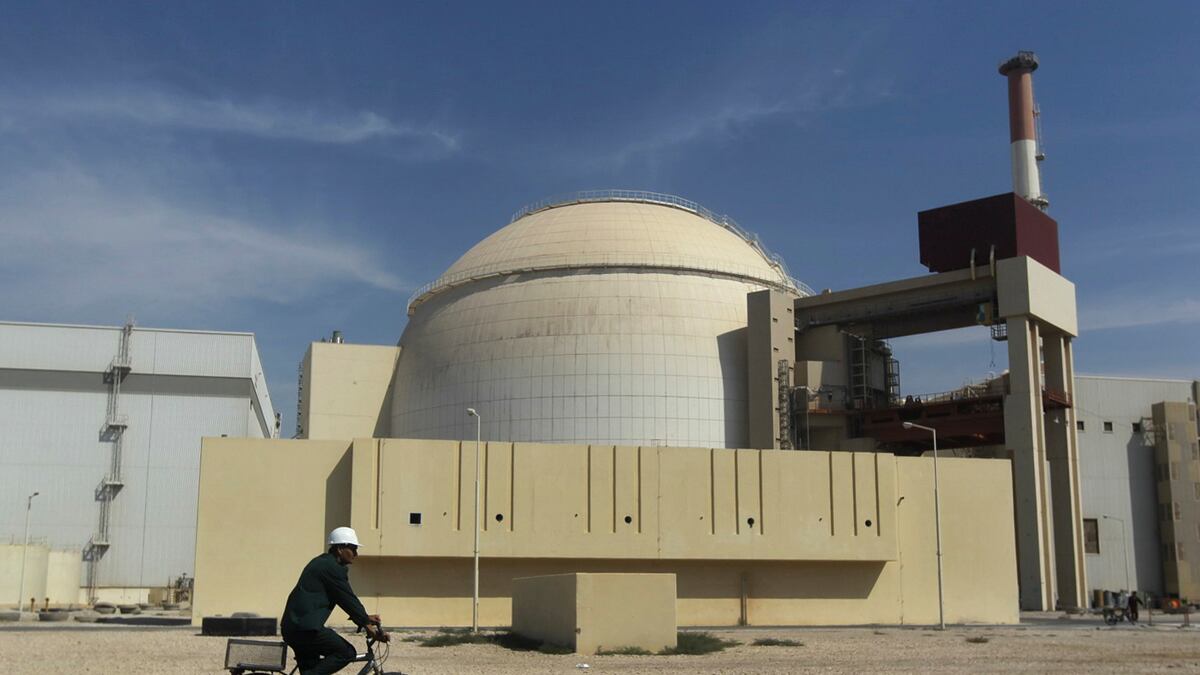Diplomacy is getting the chance President Barack Obama and Israeli Prime Minister Benjamin Netanyahu gave when they toned down talk of war with Iran over its nuclear program. Obama and Netanyahu had met in Washington on March 5, and now, six world powers, the so-called P5 plus 1 of Britain, China, France, Germany, Russia, and the United States, are to meet with Iran in Istanbul on April 13, U.S. Secretary of State Hillary Clinton announced last week. Forget the bad omens—it will be a Friday the 13th, and the previous meeting, also in Istanbul, was a total bust. The U.S. is seeking to wrest a peaceful outcome from the conflict over Iran’s alleged pursuit of a nuclear weapon, which has threatened for almost a decade to veer into open hostilities.
Iran rejects the U.S. premise. It says its nuclear work is a peaceful effort to harness the atom for civilian ends and that Washington’s real aim is not nonproliferation but to undermine the Islamic Republic. Tehran might, however, be considering its options. It is facing the toughest round of sanctions since the crisis began in 2002, when it was discovered hiding an 18-year-old program to master perhaps the most strategic part of nuclear work—making the enriched uranium that can be fuel for power reactors or the explosive core of atom bombs.
Obama doubled down on this Friday when he determined that there was enough oil in the world market to press ahead with sanctions against Iran’s oil sales. This was a crucial step in a process that began last New Year’s Eve, when he signed a law mandating U.S. sanctions against foreign banks that buy oil from Iran. These are to come into effect June 28. The European Union, meanwhile, has agreed to end its purchases of Iranian oil by July 1. Other nations such as Japan and Turkey are cutting down on their buying of Iranian crude. China has not reduced the oil it gets from Iran, but is, significantly, not increasing its purchases, even as more Iranian oil becomes available.
The U.S. goal is not to embargo all Iranian oil, but to reduce buyers so that Iran will have to sell its oil at a lower price and face a drop in the revenue that drives its economy. This on top of other measures severely hindering Iran’s ability to do business internationally definitely is hurting Iran. The question is if this is enough pain to get Iran to cut a deal on its nuclear program.
A hopeful sign is that Iran’s Supreme Leader, Ayatollah Ali Khamenei, departed from his hostile way of referring to the United States when he greeted Obama’s comments that diplomacy, not war, was on the agenda by saying, “These words are good words and an exit from delusion.” Meanwhile, Khamenei apparently has solidified his position in a power struggle with President Mahmoud Ahmadinejad after parliamentary elections in Iran in March that favored the Supreme Leader’s conservative faction. This might leave room in Iran, a country where decisions are made by consensus, for Khamenei to move toward some kind of accommodation on the nuclear issue to help business interests that are suffering from international sanctions. This is, of course, a slightly Pollyanna-ish interpretation of what is happening in Iran, but it is one some Iran experts are making.

In any case, expectations will be low for the upcoming talks. As American and European diplomats have told me, a good result would be to restart the diplomatic process, to see if the Iranians are talking seriously, and so to move quickly to a second meeting, or a series of meetings where real progress would be made. The P5 plus 1 came to Istanbul the last time, in January 2011, looking for a “concrete” gesture from Iran. What they got instead was Iran imposing conditions—that all sanctions be lifted and for its right to enrich uranium to be unconditionally endorsed—that made discussion impossible. Said one senior European diplomat: “We’re not going to buy the same horse again.” Said another: “The first move will have to be made by the Iranians.”
The Iranians say what they want is a dialogue of “mutual respect” in which a whole range of topics could be discussed. Some take this as code for Iran getting security guarantees that Washington is not pushing for regime change—the toppling of the Islamic Republic. Such guarantees would, however, have to come, if they ever do, at the end of a process, when the U.S. and its partners are assured that Iran does not seek nuclear weapons and is not in a position to make them.
Clinton was guarded in comments she made in Saudi Arabia on Saturday, saying the “window of opportunity” for a peaceful settlement “will not remain open forever.” As a sign of her doubt about Iran’s willingness to compromise, she urged Gulf states to develop a coordinated strategy to defend themselves, if necessary, against Iranian missile attacks.
Clinton’s caution stems from Iran’s intransigence over the years and its use of negotiations to delay actions against it rather than to strike a deal. Getting a deal remains a long shot. Iran would have to step down from enriching uranium to higher levels and to ship out some of its stockpile. Iran is currently enriching uranium to 20 percent, far above the levels needed for power reactors, but still below weapon-grade. It is also doing this at a site built under a mountain and so possibly invulnerable to air attacks.
These two facts have set off alarm bells especially in Israel, which fears Iran is creating a “zone of immunity” where it could break out to higher enrichment and to making the bomb. Any deal undoubtedly would involve Iran giving up 20 percent enrichment, stopping work at its mountain site near the holy city of Qom, and agreeing to some sort of fuel swap in which it would ship out enough of its enrichment stockpile, including lower-enriched uranium, in order not to have enough to make a bomb. In return, Iran would get fuel it needs for peaceful purposes, and at first a freezing of sanctions and eventually, reductions in sanctions. Both the United States and Russia have been mulling over phased plans in this direction. First, confidence-building steps might involve Iran allowing wider inspections of its nuclear work, or agreeing to give early notice of what it does.
But all this is more than anyone will be aiming for in Istanbul. For instance, the Iranians say they do not even want to discuss enrichment, as this is a right they have under the nuclear Non-Proliferation Treaty. A sign of progress, then, would be something as basic as the full session breaking off for bilateral talks between Iran and the United States. This is what happened at a P5-plus-1-ran meeting in October 2009 in Geneva, Switzerland, where a fuel-swap deal was struck, even if it fell apart later that month.
Significantly, there was no Iran-U.S. bilateral at the Istanbul meeting in January 2011 or at the meeting that preceded it, in Geneva in December 2010. The bilateral is where the real communication can take place. For prestige and practical reasons, Iran knows it must talk to the United States if a deal is to be made.
Should we be optimistic or pessimistic at this critical point? Failed negotiations could set the clock ticking again towards hostilities. The bottom line, however, is that there is an opening that was not expected as war talk escalated just before the Netanyahu-Obama summit. There is hope where before there seemed to be only process. Let’s see what happens.






